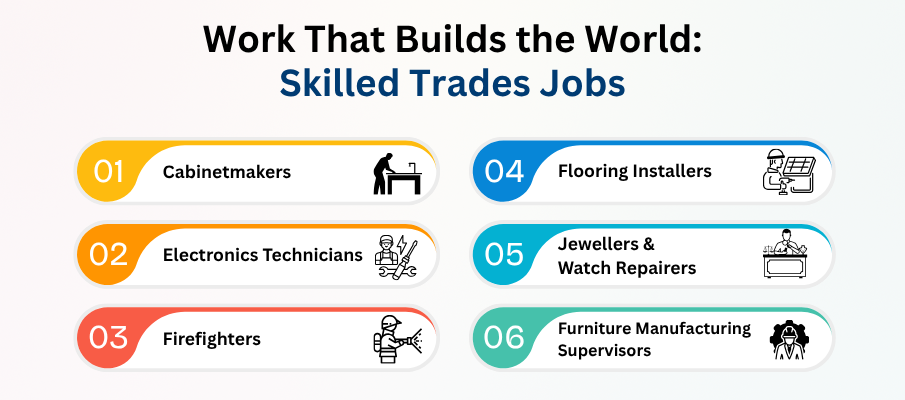In our fast-paced world, where every corner buzzes with development, technology, and innovation, one thing remains constant—the value of hands-on skill. Whether it’s the electrician who ensures your home is powered, the plumber who fixes a leaking pipe, the carpenter who creates furniture from raw wood, or the welder building infrastructure, skilled trades are the invisible force that keeps everything running smoothly. Yet, these professions often don’t get the spotlight they deserve.
Let’s look deeper into what skilled trades really mean, what kind of opportunities they offer, and how you can build a strong and respectable career through them—right here in India.
What Are Skilled Trades?
Skilled trades require specialized knowledge and practical skills rather than just academic degrees. These trades are learned through hands-on training, apprenticeships, vocational education, and real-world experience. Unlike traditional careers that may demand long years of formal study, skilled trades focus more on what you can do than what you can memorize.
There are various categories of skilled trades, including:
- Construction Trades – Electricians, plumbers, masons, welders, carpenters
- Mechanical and Electrical Trades – HVAC technicians, auto mechanics, fitters, machine operators
- Service Trades – Chefs, hairdressers, beauticians, tailors
- Technology-based Trades – CNC machinists, electronics technicians, mobile repair professionals
These jobs are about labour, expertise, precision, and craftsmanship.
Why Skilled Trades Matter (Now More Than Ever)
India has a huge youth population and a rapidly expanding infrastructure sector. Whether it’s roads, buildings, railways, airports, or smart cities, skilled tradespeople are needed everywhere. As we aim to become a global manufacturing hub through programs like Make in India, there’s an urgent demand for people who can work with their hands—and minds—to build the nation.
Still, many young people overlook skilled trades to pursue “white-collar” jobs. But the truth is, a professional welder or electrician can earn more than a desk-job graduate, especially if they own their business or specialize in a high-demand niche.
Skilled trades don’t just offer employment—they offer empowerment.
Where Can You Learn These Trades?
There was a time when learning a trade meant joining your family’s business or finding a local mentor. While that’s still a great path, the Indian government and private institutions have made learning skilled trades more structured and accessible than ever.
Here are a few key places to get trained:
Industrial Training Institutes (ITIs): Across India, thousands of ITIs provide training in trades like electrician work, plumbing, fitting, mechanics, refrigeration, and more. These institutes are affordable, often subsidized, and offer hands-on learning.
Polytechnic Colleges: Polytechnics offer diploma-level courses that combine theory with practical training. They’re a great stepping stone for those looking to start their own business or eventually pursue higher technical education.
Skill India & NSDC Training Centres: Under the Skill India Mission, the National Skill Development Corporation (NSDC) runs short-term and long-term training programs across various trades, often with job placement assistance.
Private Training Institutes & Apprenticeships: Many private players also offer quality training in areas like mobile repair, beauty and wellness, automotive service, and more. Apprenticeships at local workshops are also a powerful way to learn by doing.
What Kind of Jobs Can You Get?
The beauty of skilled trades is that they open doors to a wide range of job opportunities in India and abroad. Here’s a quick overview:
✅ Domestic Opportunities:
- Work with construction companies, manufacturing units, or service providers.
- Get government contracts or work on public infrastructure projects.
- Join the MSME sector (Micro, Small & Medium Enterprises), which relies heavily on skilled labour.
- Start your own small business—be it a welding shop, a tailoring boutique, or a mechanic garage.
🌏 International Opportunities:
Many countries, such as the UAE, Canada, Australia, and Germany, are actively hiring Indian skilled workers. They need electricians, welders, plumbers, cooks, and technicians—and they’re willing to pay well for them.
💼 Entrepreneurship:
One of the biggest perks of learning a trade is the chance to be your own boss. You don’t have to wait for a job interview—you can create your own path.

Here are some growing careers in this field:
Changing Mindsets: Skill is Not Second-Class
In India, we sometimes think a person in a uniform with tools is doing a “low-level” job. This thinking needs to change. These professionals solve real problems every day—problems most of us can’t solve ourselves.
An air-conditioning technician can keep an entire office comfortable through peak summer. A mechanic ensures that emergency vehicles stay on the road. A welder is a part of building skyscrapers and bridges. What’s “low” about that?
Skilled trades deserve respect, and more importantly, they deserve aspiration.
The Way Forward
India is at a turning point. We need engineers, doctors, and scientists—but we also need carpenters, electricians, machine operators, and automotive technicians. If we really want to build a self-reliant, skilled, and prosperous India, we must promote and support vocational training as a genuine career path.
Whether you’re a student wondering what to do after Class 10 or 12, a dropout looking for a second chance, or someone who just loves working with their hands—skilled trades are for you. They’re not just jobs; they’re careers that offer dignity, freedom, and growth.
Conclusion
Skilled trades are not the backup plan—they are the main plan for many successful people. They are practical, profitable, and deeply fulfilling. In a world where automation is taking over repetitive desk jobs, skilled hands and sharp minds will always be in demand.
So next time someone asks, “What do you do?”—hold your head high and say, “I build, I fix, I create. I’m skilled.”



